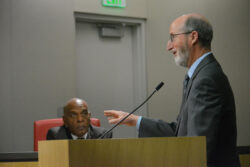
By Antonio Ray Harvey, California Black Media
With a 4-1 vote on May 8, the Senate Committee on Revenue and Taxation advanced Senate Bill (SB) 1327, a proposed law that would impose a “mitigation fee” on major digital technology companies. If the bill passes, fees collected would provide $500 million in employment tax credits to news organizations across the state.
SB 1327 is currently under review by the Senate Appropriations Committee.
Sen. Steven Glazer (D-Contra Costa), the chairperson of the Revenue and Taxation committee and author of SB 1327, believes the bill would help bolster journalistic integrity and enable media outlets to hold the government accountable through incisive and balanced reporting.
“I have voted on more than 10,000 bills. I can’t think of a more important legislative measure that I am working on than this measure,” Glazer said of SB 1327. “It’s really about a belief in how we do our work here in California and the United States. It’s about preserving and protecting our democracy.”

Senators Glazer, Catherine Blakespear (D-Encinitas), Bill Dodd (D-Napa), and Nancy Skinner (D-Berkeley) voted for SB 1327 while Brian Dahle (R-Lassen County) voted against it. California Legislative Black Caucus (CLBC) vice chair Sen. Steven Bradford (D-Inglewood) abstained from voting.
During the hearing before the vote, more than a dozen individuals voiced their opposition to the bill, including representatives from groups such as the National Federation of Independent Business, California Hispanic Chamber of Commerce, Computer Communications Industry Association, Silicon Valley Leadership Group, California Association of Realtors, California Asian Chamber of Commerce, California Chamber of Commerce, Family Business Association of California, and the Motion Pictures Association.
Bradford expressed reservations about the bill, while also acknowledging the author’s efforts to protect local journalism.
“My biggest concern is ethnic media,” said Bradford. “Even though it says that they will be considered here at the end of the day, as always, they are usually left out and still need more assistance than the other publications.”
SB 1327 would impose fees on digital technology companies with a minimum of $2.5 billion in annual advertising revenue. The money collected would be allocated to publishers of numerous community and ethnic media outlets. During a news conference on April 29, Glazer said that SB 1327 aims to “ensure that newsrooms keep our citizens informed and democracy accountable to the people.”
“The mitigations proposed in this bill would largely be used to finance an employers’ hiring and retention tax credit available to all qualifying news organizations from any government interference or involvement in their content,” Glazer explained at the State Capitol Swing Space Annex.
“With the tax credit covered by the fee revenue, we estimate, a total of $500 million

annually. Under this bill, local news organizations, either print or broadcast, could claim a tax credit for wages paid to full-time journalists,” Glazer added.
Blakespear, who has worked for the Los Angeles Times and The Associated Press, said, “We cannot have informed voters if the free press isn’t telling all of us what our government is doing.”
Glazer mentioned that Meta, Google, and Amazon and other large digital technology companies could be subject to the mitigation fee.
Peter Blocker from the California Tax Association told the Revenue and Taxation Committee that the organization, which represents a broad coalition of individuals and business taxpayers, opposes SB 1327.
“It would raise operation cost for small businesses in the state, increase prices for California consumers, and, if passed, would be met with numerous legal challenges because the tax it would impose is illegal under federal and unconstitutional,” Blocker said.
To qualify for the tax credit, news media outlets must primarily circulate or distribute news content in the state and operate internet platforms within the state. The news organizations must also have published in the current and previous year and carry media liability insurance.
“I will just say that I have no love for the giant corporations in our state who mine, maybe manipulate, and use data taken from me and marketed to me. I don’t appreciate that,” Sen. Dahle said. “But taxing them and redistributing, that is, quite frankly, one of the huge problems we have with our (budget) deficit at the state level because those companies are leaving (the state). The tax structure in California is horrible.”
Glazer explained that the eligibility for a tax credit is based on the number of reporters employed by the news organizations, the amount of new hires, and whether news organizations offer health and retirement packages.
Local media outlets employing 10 or more full-time journalists would receive a basic credit equivalent to 25% of wages paid while media outlets with fewer than 10 employees with an expectation of expanding their workforce would receive a credit equal to 35% of wages paid. A reporter earning a yearly salary of $60,000 would generate 24,000 in tax credits, according to Glazer.
SB 1327 would also allocate $25 million annually to non-profit local news organizations that would not benefit from tax credits. Glazer mentioned that the tax credits for wages paid to reporters under the bill were designed with media outlets of color in mind.
“In fact, the small publication options were really tailored after ethnic publications and how to make sure we’re helping them more because of the challenges space in which they operate,” Glazer told California Black Media (CBM).
Paul Cobb, the publisher of the Oakland Post, a Black media outlet that has less than 10 employees, acknowledged his agreement with some aspects of SB 1327, but expressed a desire to further examine the details of the legislation. The Oakland Post is the largest Black publication in Northern California.
“SB 1327 presents an opportunity for the Governor to continue the recent California Legislative reparations policy initiatives by issuing an executive order directing all government agencies to provide Public Notice placements to qualified ethnic local media,” Cobb said.


